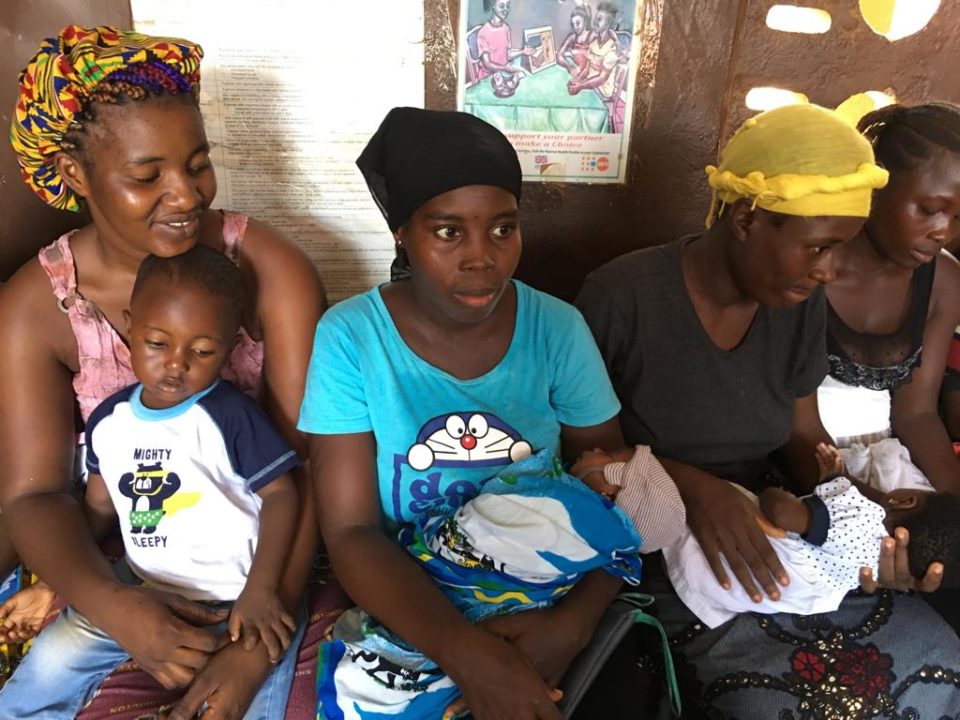 Blogs
Blogs
December 4, 2019 • 4 min read


Midwife Ndoko has received training and on adolescent-friendly reproductive health services, and on providing a private and supportive environment without judgement
The scorching sun is beating down as we walk up the hill to the community health centre in Koya, a suburb in eastern Freetown, the capital of Sierra Leone. As we approach the GOAL supported Ministry of Health facility, we hear singing coming from the 40 or so young pregnant mothers gathered inside for the monthly Maternity Open Day. The singing marks the start of this session being hosted today by midwife, Ramatu Kanu, who is ready to brief the young women on important maternity health issues.
Sierra Leone has one of the highest rates of teenage pregnancy in the world, an issue which escalated after the Ebola crisis in 2014. Approximately three in every ten teenage Sierra Leonean girls get pregnant before the age of 18, and GOAL’s Irish Aid-funded Adolescent Sexual Reproductive Health Programme supports the Government of Sierra Leone in preventing and reducing teenage pregnancies and pregnancy-related mortality. The maternal mortality rate in Sierra Leone is the highest in the world, with 25 per cent of those maternal deaths adolescents.
The Adolescent Sexual Reproductive Health Programme is being rolled out in several communities in Freetown, as well as in Kambia in Northern Sierra Leone and Kenema in the East. Since its inception two years ago the programme has helped empower thousands of young men and women to make informed choices when it comes to their sexual and reproductive health, and the indicators are that adolescent births and maternal deaths are decreasing.
Inside the Adolescent Sexual Reproductive Health Programme
Midwife Ndoko, who was trained by GOAL in adolescent-friendly reproductive health in says women who give birth in the clinic is aged between 17 and 22 years. She started working in the clinic ten months ago and has already helped a 13-year-old girl give birth.
“This girl had no support from her family when she got pregnant. She was thrown out of home and went to live with her boyfriend’s family. He was 30 years old. But she gave birth to a healthy baby and is doing fine. Since I started working here, I have seen an improvement in attitudes. Girls are very keen to learn how to plan a family and the importance of contraception. They are open to listening and understanding that some of the information they get is wrong. “

17-year-old Yeanoh Kargbo, who gave birth to a son at the clinic a year ago shares her experience with pregnant girls at the Open Maternity Day.
One of the girls attending today’s Open Maternity Day is 17-year-old Yeanoh Kargbo, who gave birth to a son at the clinic a year ago. She shares her positive experience with the other pregnant girls.
“I received great support from the clinic. At first I was afraid and I tried to hide my pregnancy in school so I could finish my exams. Before I got pregnant I did not know about family planning. I am lucky that I am supported by my parents who are minding the baby so I have been able to go back to school. I want to do well and go to university.”
“I was also afraid about child birth but I was assured if I looked after myself and took health advice it would be ok. When I started my labour I came here to the clinic and my baby was safely delivered.”
After the clinic we call into a Community Dialogue session on adolescent sexual health taking place outdoors under a mango tree a few hundred yards from the health centre down the hill. This dialogue is also part of the GOAL Adolescent Sexual Reproductive Health Programme. About 30 community members, mainly adolescent boys and girls, are taking part. They are split into three groups with each group being asked to write down on flip charts what the issues were around adolescent health before the programme started two years ago, and what the improvements have been.
One of the groups identified domestic violence in the community as an issue before the start of the community dialogues. Today they say there has been a significant reduction in cases of domestic abuse.
Another issue was a reluctance and a fear of going to hospitals or the local health facility. Now community members are frequent attenders of the health facility.
Another group identified lack of information on family planning as being a huge issue two years ago. “Many people said a woman who used family planning will not bear children in the future. And that family planning was a licence for girls to engage in sex. But GOAL has helped our community to get involved in family planning. The stigma around family planning is no more and there is awareness now.”
